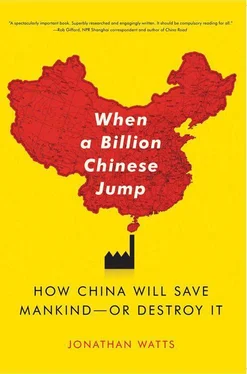My next stop was at the municipal office, where Zou Xiaoping, deputy director of the economic relations commission, explained how her city was at the heart of China’s vast government plan to address the inequalities between the rich eastern coastline and the poor western interior. The “Go West” strategy, as this policy was called, brought more than 1.4 trillion yuan ($200 billion) of government investment into industrial development, urbanization, and power projects such as the Three Gorges Dam. 7
“Now is the peak time of the development of western China. Chong-qing is in the middle of it. That is why we are growing so fast,” said Zou. “We must maintain momentum. This is a crucially important time for our city.”
I left Zou’s office flabbergasted. Even at the height of Western urbanization in the nineteenth century, there was nothing to compare with the scale and speed of change taking place here. 8How could space and jobs be found for so many new arrivals? Now accompanied by a government guide, I drove to the city limits and the newly built Lifan Sedan factory in the Chongqing Economic Zone, where newly employed workers were putting together newly designed cars.
“This was farmland a couple of years ago,” boasted the proud boss Yin Mingshan. “It is my fourteenth factory, fourteen years after I started business.”
I took an immediate liking to Yin. Dapper, twinkly-eyed, and engaging, the sixty-eight-year-old was one of the nation’s great industrial pioneers, a twenty-first-century Chinese equivalent to Josiah Wedgwood, Henry Ford, or the Cadbury brothers. Imprisoned for much of the Mao era for his views on free speech and capitalism, he started out in business in 1992 running a motorcycle repair company with a staff of nine. At the time of our meeting, his Lifan company had expanded to employ 9,000 workers.
“China has become a wonderland for entrepreneurs,” Yin said as he showed me a scale model of his empire. “There are many people who are doing what I have done.”
It was not as easy to build a business in Chongqing as in coastal Shanghai or Shenzhen, where companies could benefit from access to overseas markets, ports, and close supply chains. But, prompted by the government and rising costs, such rich eastern cities had started investing inland. Chongqing was famous for motorbikes; Yin was trying to make it equally respected for cars. He bought a BMW-Chrysler factory in Brazil, had it broken down, shipped it up the Yangtze, and then rebuilt it in Chongqing. He also set up plants in Vietnam, Thailand, and Bulgaria and planned to open a research center in Britain, where his daughter was studying at Oxford.
His creed was one of benevolent self-interest. He wanted his country to become a nation of consumers. “China is too poor. We need high-speed growth. The rich need to increase the income of the poor,” he said. “If we improve the living standards of farmers, then they can buy our motorcycles and cars.” Within five years, he aimed to more than double his workforce to 20,000. Next to the factory, bulldozers were already churning up fields for another plant.
It was the same story across China as land was gobbled up by factories, roads, and expanding cities. Between 1986 and 2000, about 1.2 million hectares of arable land were converted into built-up areas, mostly small towns of 5,000 to 10,000 people. 9The loss of farm fields was a common phenomenon in fast-developing countries, but while other smaller nations were able to offset this trend by importing food, this was not as easy for a huge country like China, which had to partly make up for the deficit by reclaiming more land from coastal waters, forests, wetlands, grasslands, and desert. 10
Driving back from the factory, I counted more than thirty cranes in less than five minutes on the border between the countryside and the city. Just outside the Jiangbei tollbooth, farmers toiled under heavy loads in vegetable fields and women washed their clothes in a stream. Behind them, thirty-story towers were silhouetted against the gray haze. Where the two worlds met was a corridor of rubble as land was cleared for further expansion.
We made an impromptu visit at a building site, where Chen Li, a brash window fitter, kindly delayed his lunch to tell me about his work. He had arrived in the city nine years earlier at the age of sixteen. Since then he reckoned he had worked on between seventy and eighty high-rises. “The buildings are getting taller and better,” he said. The improvement in his life was not as evident. Chen lived in a hut on the site, his breakfast was a glass of soy milk and a steamed bun, and on an average day he worked eleven hours for about 50 yuan ($7). “I’m a city resident now. But life is still difficult.”
He was helping to build a city that seemed determined to overtake New York. The municipality was erecting a hundred skyscrapers, including the tallest in western China, the Chongqing Super Tower. Once finished, it will dwarf the replica of the Empire State Building that already rises up in the city center.
It was a similar story throughout the country. During the first quarter of this century, half of all the world’s new buildings will be erected in China. Fifty thousand of them will be skyscrapers, equivalent to ten New Yorks. 11
I headed upward to the roof of a tower block, where I met Li Zhiguan, one of the millions now making a living nearer the sky. Formerly a farmer, then a factory worker, Li had recently become one of the many high-wire artists cleaning skyscraper windows, earning him the nickname Spider-Man. We met him at the top of a twenty-four-story telecom office just before he rappelled down the glass on a rope attached to him by a single clip. “It is 100 percent safe. You can go too if you wish,” said his boss, He Qing, with a strong German accent picked up studying for an MBA in Mannheim.
With so many towers going up, Li was never going to be short of work. And he had a bird’s-eye view of the transforming cityscape. “In six months, there have been huge changes. You can notice it from one week to the next.”
The skyscrapers Li saw rising up around him were better for the environment than urban sprawl. Tall, densely populated cities consume less land and allow for greater efficiency of transport, energy, and waste management. 12China was belatedly trying to reorganize its urban centers after decades of barely regulated expansion, particularly of small towns that threatened to reduce the nation’s farmland below the minimum that the government considers necessary for food security: 120 million hectares. 13To avoid this, the state aimed to concentrate more of the population in megacities and to halt urbanization in the less spoiled and most ecologically fragile regions of Tibet, Guizhou, Ningxia, and Qinghai. 14
Done right, cities can ease humanity’s stress on the environment, according to the demographer Joel Cohen. 15They already provided homes for half the world’s population on just 3 percent of the planet’s land. 16An even bigger proportion could be accommodated if urban expansion was upward rather than outward, if there was good investment in public transport, and if energy efficiency was promoted through urban planning and architectural design. With an extra two billion people likely to join the planet’s population by 2050, the best way to make space for everyone is to house them in the sky.
But while compact, clean, vertical cities are the modern ideal in Europe, Japan, and Canada, urbanization in China has long tended toward the 1950s U.S. model of big suburban villas and commuting by car. Thomas Campanella, the author of a book on the country’s urban revolution, wrote that the differences could hardly be greater: “When it comes to the environment, China and the West are moving in opposite directions, and at blinding speed.” 17The result, he concluded, was sprawling inefficiency and worsening emissions.
Читать дальше










